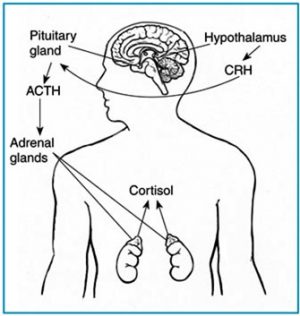How PTSD and High Cortisol Affect Us – Part 1
by Eileen Nauman, DHM (UK)
Copyright 2009 Eileen Nauman
All Rights Reserved
 SYMPTOMS OF HIGH CORTISOL
SYMPTOMS OF HIGH CORTISOL
You don’t have to go to war to suffer from Post-Traumatic Stress Disorder (PTSD). You can get it from something you experienced during your childhood—or at any point during your life, from a trauma of any kind. In addition to the mental and emotional havoc PTSD causes, there is also the physical after effects of the trauma—which can last months or even years. When a stressful event occurs, the hormone, cortisol, is released into our bloodstream along with adrenaline. Both are manufactured by our adrenal glands.
Here is a good illustration of the adrenals, which sit atop our kidneys. For most people, when a stressful or traumatic situation takes place, the cortisol and adrenaline shoot into our blood stream. Once the threat is over, the pituitary gland sends out its own hormones to stop hormones produced by the adrenals from continually pouring into our bloodstream. However, for those of us who suffer from PTSD, our high cortisol levels do not shut off by the pituitary gland.
The haze of chronically elevated cortisol in your body can create a nightmare existence for you (and those around you) on all levels. The good news is that it can be corrected and eventually cured.
WHAT IS CORTISOL?
Cortisol is a hormone that is supposed to help us cope with the daily stress in our lives. It converts protein into energy, releases glycogen (sugar), and counteracts inflammation. In the short term, cortisol protects our bodies from stress. However, when the cortisol does not subside and return to healthy levels, our bodies go into a “panic” state where we may feel constantly angry, anxious, or under threat for no apparent reason. It may feel like we’re living two lives: the one we maintain for the outside world and the one where we constantly struggle internally.
HIGH CORTISOL STAGES
Our first stage occurs when we feel threatened in some way (it could be anything from feeling unsafe to stress over money, or even temperature fluctuations, or an infection of some kind). During this phase, the endocrine system kicks in and cortisol is released. Our heart beats faster, our blood pressure rises, and our pupils dilate. This is the reaction stage to a perceived threat.
Our second stage is the adaptation phase. This is the stage when we are living with chronic, unrelenting stress. The stress triggers could be your job, a partner, financial uncertainties, etc. We may go years in this stage but eventually, our chronic stress catches up with us and then we “cascade” into the last stage.
The last stage we enter is a state of exhaustion. This is where the cascade effect of symptoms occur because the body’s reserves have been under attack for so long. Our bodies are often depleted of vital minerals and other nutrients. At this point we may reach a point of emotional breakdown or physical collapse, such as a stroke or heart attack. People at this phase often feel “trapped”. The conventional approach is often to seek the help of a psychiatrist and prescription medications. However, there are alternatives.
WHAT DOES HIGH CORTISOL DO TO US?
Cortisol has a role in regulating blood sugar, energy production, inflammation, supporting the immune system, and in healing. High cortisol levels are caused by a sudden trauma or a chronic stress. However, what is considered high stress or a trigger for me may not be the same for you. Each person and their stress coping mechanisms are different based on a multitude of variables in our individual lives. Remember, every person responds to stress differently. The stress of our environment—weather, pollution, noise, personal safety, etc.—all play a role in personal stress levels.
If we continually experience high cortisol levels, the immune system becomes suppressed and our body’s healing ability slows or even stops. Glycogen (sugar) reserves in the liver and muscle tissue are initiated and cause fluctuations in blood sugar levels (hypoglycemia or diabetes). Digestion and assimilation of nutrients becomes inhibited. The stomach lining becomes thin and ulcerated, and our thymus gland and lymphatic tissue shrinks.
SYMPTOMS OF HIGH CORTISOL
ABDOMEN: People with high cortisol almost always tend to have weight gain concentrated in the abdominal area. Abdominal fat is the thickest and hardest to get rid of—even when you diet and exercise.
ADDICTIONS: Prescription medications, recreational drugs, alcohol—anything to escape the monster inside yourself that keeps you anxious. Drugs and alcohol help nullify this sense of being threatened, anxious, or unprotected and can lead to a downward spiral of addiction.
FOOD ALLERGIES: Allergies that develop toward certain food groups such as wheat, dairy, nuts, etc., and exhibit through chronic gastrointestinal issues.
ANXIETY: Anxiety makes people feel jumpy and nervous, and it produces feelings of tension that never go away. Tension can exhibit itself physically through pain or tightness in the neck, shoulders, back, or anywhere else in the body where we “store it”. It’s also the inability to relax and feel at peace, as though there’s always a nagging background noise in our lives.
BONE LOSS: If your adrenals are compromised, they will not produce sufficient DHEA. This contributes to bone loss, a shrinking of the spinal column, and ultimately loss of height.
BOWELS & DIGESTION: Constipation or diarrhea is a constant—especially under prolonged or acute stress. Someone may find themselves either going to the bathroom 5-10 times a day or they’re constipated for 2-3 days at a time. Bowel movements only return to normal (3 BMs a day), after stress is relieved from the person. If not, then they cascade into other diagnoses, such as irritable bowel syndrome, diverticulitis, diverticulosis, or Crohn’s disease. If you’re having heartburn or ulcers, consider taking Biotics Research “Hydro-Zyme” with each meal.
SELF-CRITICISM: Being overly critical of yourself, blaming yourself for not doing the right thing all the time, critical of yourself for every small mistake, putting yourself down, never feeling good about yourself, feeling ashamed, or not “good enough.” Low self-esteem. This little voice of self-doubt often begins in early childhood when an adult(s) or peers told you that you were not good enough, did not measure up or in some way, or disappointed them.
DEPRESSION: It either comes and goes or is there all the time. When under stress, the depression can become more chronic; and when the stress lessens, the depression will lift somewhat or go away completely—depending on the person and circumstance.
DREAMING: You may no longer dream. Or if you dream, you don’t remember what you dreamt. Under severe stress and our cortisol levels are high, we lose our ability to sleep restfully. For some individuals whose cortisol levels are elevated at night, they may have dreams of violence, a sense of vulnerability, or feeling unable to protect themselves adequately.
ENERGY LAG: From about 2 pm to 4 pm every day. Those who suffer from these energy dips may use caffeine drinks (coffee, tea, soda) as a “pick-me-up”—all red flags.
EXTREME EXERCISING: There’s an obsessive drive to exercise in order to take the edge off feelings of anxiety or restlessness, and we turn to exercise as a way to “tame” these feelings. We do it as a subconscious attempt to lower our anxiety (cortisol) levels.
FATIGUE: You always feel tired. Even if you sleep twelve hours you still wake up feeling exhausted and tend to hit a wall of fatigue between 2 pm to 4 pm daily.
HEALING: Slowed. Slow regeneration or slow recuperation. If your cold or flu lasts longer and your recuperation time is abnormally slow, you are affected by chronic high cortisol levels.
HYPERINSULISM: Plainly stated, your insulin levels are too high. Chronic stress/high cortisol antagonizes insulin and will cause functional insulin resistance. The moment you eat a carbohydrate (pasta, bread, etc.) the body has a hyperinsulinism response. This is chronic insulin resistance and will lead, eventually, to pancreatic exhaustion. Further, the body makes fat cells instantly out of any carbohydrate being consumed. You end up gaining weight because the body did not break the carbohydrate down as energy as it should have.
HYPOGLYCEMIA: Low blood sugar. You can experience it either during the night hours or during the day time. Consider trying Biotics Research Bio-Glycozyme Forte with each meal.
IMMUNE SYSTEM: Can be compromised a little or a lot. For example, you regularly get colds or seasonal flu—and you don’t recover quickly.
IRRITABILITY: Small things make you irate, or you trigger too quickly, exhibiting anger or clouded emotional judgement. Irritability is always in the background with anxiety and high cortisol. And when you do fall victim to it, you later realize it was the inappropriate emotion to have.
JOINTS: As the cortisol cascade continues, our joints will take a hammering and we may suffer from constant aching. Arthritis is usually the outcome over time.
MEMORY: You’ve become forgetful. You may think you have Alzheimer’s, but you don’t. This usually gets worse with age.
METABOLISM: The adrenals and thyroid are directly affected. Only saliva and blood testing will confirm they are in a cascade due to high cortisol levels. The adrenals may be in one of the seven levels of exhaustion. The thyroid usually goes “hypo” and is slower than normal. This gives you an array of hypothyroid symptoms. The real culprit, however, is high cortisol. Get that fixed and your thyroid will usually return to normal functioning by itself.
MUSCLES: They will be destroyed over time. Loss of muscle mass. If you’re exercising, lifting weights, and muscle mass is hard to create, then you likely have high cortisol levels.
NEGATIVE OUTLOOK ON LIFE: No matter what happens to you, even good things, you always fear something bad will happen next. You cannot take joy in your triumphs. You can’t absorb the confidence that comes with these triumphs. You are always waiting for something bad to occur. There is little joy or happiness in your life. You see it as one slogging day after another. The only emotions you really feel are fear, anger and threat. There’s a loss of trust in people as well as yourself.
NOISE: Can’t tolerate loud noises of any kind. This sends the person into irritability or anger. Sometimes, uncontrolled rage at the worst and irritability at the best.
ODORS: As an example, perfume will send you into orbit. You can’t stand strong smells of any kind and will avoid a perfume counter at all costs. Many can’t go into a hospital because of the sanitizing odors. Or at the gas pump, the gas smell creates a terrific headache within minutes of inhaling the odor. Headaches or migraines are a common response to any odor that triggers you emotionally.
SEX DRIVE: Decreased to nonexistent.
RELATED DIAGNOSIS: If you suffer from fibromyalgia, chronic fatigue syndrome, arthritis, or premature menopause, these can all be tied into high cortisol levels and/or adrenal exhaustion.
REFERENCES:
Schmookler, E., Ph.D., Trauma Treatment Manual, 1996, Revised 2001, http://www.trauma-pages.com/s/schmookler-manual.php
Diagnostic and Statistical Manual of Mental Disorders, 4th edition, American Psychiatric Assn., Washington, D.C., January 1995
The Merck Manual of Diagnosis and Therapy, 16th Edition, edited by Robert Berkow, MD, Merck Research Labs, Rahway, NJ, 1992.
Butler, K., The Biology of Fear, July/Aug. 1996, The Family Therapy Networker, Washington, D.C.

